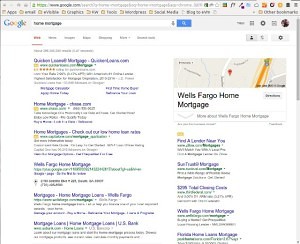
Do you remember Lycos? In 1999 it was the world’s most visited website. How about the Yahoo directory?… The Open Directory Project?
In the 1990’s, if you had a website, getting listed in The Yahoo Directory was at the top of your to-do list. And submitting your site to search engines and directories like eXite, Altavista, infoseek, Hotbot, and Ask, was a weekly exercise.
Even before 2000, there were millions of websites, but no really effective way to automate the indexing thereof… while leaving out the mountains of useless low-value (“spam”) sites.
What is a Spam Site?
We’ve all experienced it… You open a search engine and enter a search query. But the results are mostly auto-generated pages that provide nothing of value.
In the early years of the web, this was an ongoing problem. And, short of physically inspecting each site before allowing it into the index, there was no cost-effective way to separate the sites with valuable information, from the sites that had none.
In those days, search technology was limited to language processing, keyword & prefix matching, and word proximity. The problem with this approach was that a webmaster could edit his site in a manner that allowed him to “game the system,” and trick the search algorithm into displaying his page as one of the results. [clickToTweet tweet=”The day is rapidly approaching when the ranking factors of yesterday and today will be largely irrelevant.” quote=”The day is rapidly approaching when the ranking factors of yesterday and today will be largely irrelevant.”]
Enter: Google
In 1998, a couple of college kids, (Larry Page, and Sergey Brin) had the bright idea that ranking web pages (in the search results page) based on how many links it received from other web pages might provide cleaner, more relevant results.
A website’s authority, also known as “Pagerank,” was calculated based on how many links from other sites that it received.
This was a brilliant way to effectively crowdsource the vetting of websites in order to identify the ones that had good content. When a webmaster links to another website, he has personally checked to make sure that it adds value to the reader’s experience.
Slowly, the idea caught on. In 1999 Google received $25 Million in funding from Sequoia Capital.i A few short years later 19 million shares of GOOG were offered on the NASDAQ for $85/share.
What is Google’s Secret?

Google is the big player in search because of their relentless focus on providing good answers to the questions people ask.
In the parlance of search technology, the question you type into the search box is a search query. And Google’s mission is to provide relevant results to every search query.
When you type a question into the Google search box, there is an algorithm (a process) going on behind the scenes that combs through nearly 1 Billion websites.
The Search Engine Results Page (SERP’s for short) that it comes back with, is a list of links to the web pages Google predicts will provide the answer you seek.
If Google returns relevant results… That is, when you consistently find the answers to your questions within the SERP’s… You will continue to use Google for search.
Why is this such a big deal? According to NetMarketShare, between January and April of 2015, over 62% of all searches performed on a desktop computer used Google. While more than 91% of all mobile & tablet users search with Google.
That level of adoption is evidence that Google returns relevant results for the vast majority of search queries.
“What does that even mean?”
If you establish a reputation for providing good answers to people who come to you with questions, you can begin to offer results provided by advertisers whose product or services are also relevant to that search.
When you use Google to search for “home mortgage,” or “car insurance,” “diamond rings,” etc; above the organic (free) results, you will find results marked with a bright orange/yellow rectangle that clearly identifies them as advertisements. The same is true of the narrow column over on the right hand side of the organic results.

The beauty of this system is that the advertisers do not pay a fee to be listed in the search results.
Advertisers only pay if someone clicks on their ad and are taken to the special “landing page” that the advertiser has set up for those who respond to the ad.
What’s more, Google ranks ad results using a formula that takes into account how many people click on the ad. If an advertiser writes an effective ad, and more people click on it, that advertisement will be ranked higher than one that does not get as much response.
This is a win-win-win for all parties. The searcher finds the ad to be a relevant answer to his question (else he would not click), relevant ads receive more traffic (at reduced cost per click), and Google receives more revenue.
How much money?
According to Marketwatch, Google had gross revenues of $65.83 Billion in 2014.i Further, according to Statista (a statistics portal), over 89% of Google’s 2014 revenue came from advertising.
Put another way, those little ads you see on the Google search results page, and on other websites, brought Google more than $59 Billion in 2014.
So What?
When you understand someone’s motivation, you can understand why they make the choices that they do.
In order to protect, and grow that $59 Billion revenue stream, Google is fanatical about providing relevant, useful results to their ultimate consumer, the searcher.
Further, in order to fulfil their mission of providing relevant, useful results, Google wants to create an index of available information. All of it. Everywhere. Not just websites, but books, magazines, music, video and so on.
You, the webmaster, want your site to be found, so that you can get more readers, more viewers, sell more widgets, make more money, and feed your family… Google, as well as the other search companies, provide a platform that allows you to do this.
This informal relationship is symbiotic, not adversarial. If Google [or any other search engine] wants to make any revenue, they must provide results that the individual searcher finds valuable.
What Do I Need to Do?
All you have to do is create content. Write, record, photograph, or video those things that are relevant to your website, and beneficial to your visitors. Then post them. Regularly, and often.
If you focus on creating content that your human visitor will consume, Google will index your site. [clickToTweet tweet=”All you need to do is create content. Regularly, and often. Focus on the human reader.” quote=”All you need to do is create content. Regularly, and often. Focus on the human reader.”]
What About SEO?
This is a subject that deserves attention, and I will deal with it in a future installment. However, for now, it is important to keep in mind that search technology is evolving rapidly, and has

come a long way since the introduction of Pagerank.
Google’s algorithm has evolved, and will continue to do so.
In addition to relevant terms, Pagerank, authority, and a whole slew of other ranking factors, new parameters have been introduced. Including, but not limited to:
- Content freshness (People want new material, Google aims to give the people what they want).
- User engagement (click-through rate, time on site, bounce rate).
- Technical performance (how fast is your website?).
- Mobile responsive (does your site render in mobile devices?).
- Social media signals (pins, tweets, likes, +1’s, etc), though these may hold less influence as time goes on. Just like backlinks, social signals can be manipulated.
Since the beginning, webmasters and SEO practitioners have been debating the number of ranking factors, and their functions. Some have even conducted extensive testing, and made educated guesses about function and importance of any number of factors.
There is no shortage of opinions. Is Backlinko correct? Are there 200 ranking factors? Or are 200 ranking factors a myth? Only Google knows for sure.
What is Really Important?
I’ll let you in on [what should not be] a little secret… Whether Google uses 200 ranking factors, or 20, is not important.
Just as in your brick-and-mortar business, the focus of your digital marketing efforts should always be twofold:
- Make your visitors feel welcome by giving them what they came for.
- Create an environment that encourages your visitors to stay.
Everything else is just quibbling over details.
There is another reason as well why ranking factors mean little…
The Future of Search Technology
The day is rapidly approaching when the ranking factors of yesterday and today will be largely irrelevant. Computing power and search technology will be so advanced, that in 10 years’ time, “keyword density” and “backlinks” will be a distant memory.
In December 2012, futurist Ray Kurzweil (advocate for the technological singularity) joined Google with a mission “to bring natural language understanding to Google.” In June 2014, he announced in a talk that progress on this effort is good.
Regardless of how search engines and social media change. Some things will remain constant:
- Produce content that people want to consume, and make it easy for them.
- Develop a reputation for quality.
- Do good business.
As eVisible Marketing, my raison d’etre is to help you accomplish these goals.
Watch this September 2013 video of Marcus Tandler giving a talk at TEDxMunchen, in which he discusses the future of search:
